|
Edited
by Frank R. Shaw, FSA Scot, Dawsonville, GA, USA
Email:
jurascot@earthlink.net
By
way of introduction, I am combining two separate events involving noted
Burns academic scholar and Scottish poet, Robert Crawford, Professor of
Modern Scottish Literature at the University of St. Andrews. Crawford has
published six collections of poetry along with two dozen other publications.
He is also author of The Bard, Robert Burns, A Biography which I
proclaimed in February of 2009 to be the definitive biography on Burns - and
since then nothing has happened to change my mind. Earlier this year
Crawford won The Saltire Award for his biography on Burns as Scotland’s best
book of the year, adding a wee bit of support to my proclamation. Last week
my wife and I had opportunity to attend a poetry reading by him one evening
and were present the following afternoon when he presented a lecture on
Robert Burns and the American Declaration of Independence.
Poetry Reading by Robert Crawford
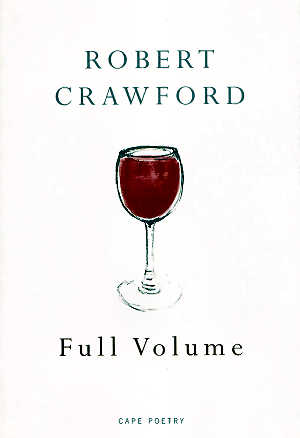
Last Thursday we made our way over to Columbia for the Fall Literary
Festival at the University of South Carolina, sponsored by the Department of
English and the Thomas Cooper Library. On the four-hour journey we had our
usual golden moments of conversation when the “outside world” was left
behind and it was just the two of us to chat without interruption. We both
agreed that a poetry reading was not common fare for either of us because of
our all-too-busy “retired” status. We first met Robert last year while
attending a Burns conference at the Library of Congress in Washington. We
immediately liked him and enjoyed his speech, so he has been a favorite of
ours ever since. After all, he is one of Scotland’s most accomplished poets,
professors, and authors.
During our drive that day, I couldn’t help but think of my English teacher
at North Charleston (SC) High School with the never to be forgotten message
above the building’s entrance for all to see, “Education is a possession of
which man cannot be robbed”. Dorothy White gave me the help I needed as I
struggled with English. I received my diploma because of her extra efforts
in working with me after school, and I think of her often and will forever
be grateful. I thought Miss White would be proud to know I was going to a
poetry reading.
As
we made our way along the various interstate highways to Columbia, I
recalled a statement I had made to my wife the previous night as we
completed the latest article for Robert Burns Lives!. I remember
looking at my watch and remarking that “this time tomorrow we will be in
Robert Crawford’s poetry reading presentation, and I can only hope I do not
go to sleep.” As usual she had her normal words of encouragement saying it
would be better that I thought.
It
was! Much better!
I
found Crawford’s poetry and presentation of his own work to be exhilarating,
upbeat, humorous, exciting, full of wisdom and grace, and fun. I’d like to
go to another poetry reading as long as it is Crawford at the podium!
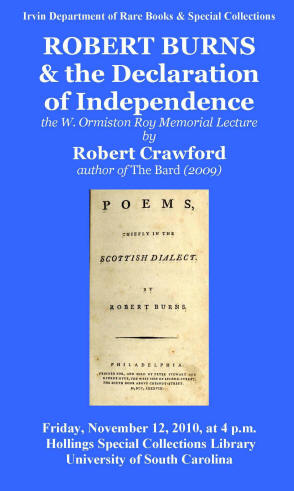
Robert Crawford read poems from his book Full Volume and other
unpublished works. He referenced a quote that we would do well to remember:
I’m
truly sorry Man’s dominion
Has broken Nature’s social union
Robert Burns
He
opened with the following reading:
ADVICE
When you are faced with two alternatives
Chose both. And should they put you to the test,
Tick every box. Nothing is ever single.
A seed’s a tree’s a ship’s a constellation.
Nail your true colours to this branching mast.
For 45 minutes he enthralled us with other poems, and the one for Kay
struck home with me.
SAME, DIFFERENCE
for Kay
Since each is shaped
by all its drift,
by every updraft
from high cloud to ground,
in all the history of the world
a snowflake’s double
can’t be found.
Since each is shaped
by all its drift,
by every updraft
from snowflake to ground,
in all the history of the world
a high cloud’s double
can’t be found.
A
world of difference flecks each word.
Nature abhors a Henry Ford.
I
marvelled at this descriptive poem:
CEMETERY
Anon
Our
lips are sealed.
Our language now is murmured
Nowhere above ground.
Teacher
The
traditional
Gaelic inscription translates,
‘Not enough wild sex’.
Librarian
All
flesh is grass, but
I hope also to become
A yellow iris.
Priest
Friend, when you read this,
Bear in mind without a doubt
There can be no faith.
Deer
In
death as in life
Breathless and isolated
I run with the herd.
Bottle
I
saw it happen.
I could not stop it. Always
I wept through one eye.
Telephone Engineer
I
connected up
Wet, remotest villages;
Let their sound carry.
Of
particular interest to me was CLAN DONALD’S CALL TO BATTLE AT HARLAW. This
presentation by Crawford was his best of the evening for me, but then I
probably have a greater interest in this part of Scottish history more so
than most present at the poetry reading. Among the 10,000 men fighting
with Donald, second Lord of the Isles, at Harlaw 18 miles from
Aberdeen in 1411, was James Shaw, son of Shaw Coriachlich, progenitor of
Clan Shaw. Unfortunately James was killed in the battle. Donald made his way
back to the Isles the next day, having lost hundreds of men. I have often
maintained that a body of 10,000 warriors could not help but take back some
wives as they made their way through Shaw territory (going to and coming
from Harlaw). In talking with those in authority in Edinburgh, there is no
documented proof this happened but then they admit there is nothing to say
that it did not happen.
In
the summer of 2009, Susan and I took a trip the two of us had dreamed about
for years. Along with grandchildren Ian and Stirling, then 9 and 7 years of
age respectively, and their parents, son Scott and his wife Denise, we made
our way to Scotland and to the Isle of Jura, less than a mile from Islay,
home of the Lord of the Isles. We went to visit the home of our ancestors,
so no wonder this poem was of interest to me.
A Lecture by Robert Crawford
Robert Burns and the American Declaration of Independence
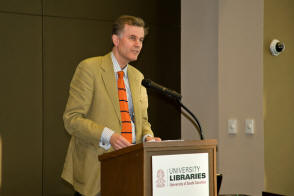
Robert Crawford during lecture at the University
of South Carolina. Picture provided by Dr. Patrick Scott
The following day Crawford delivered the W. Ormiston Roy Memorial Lecture
commemorating the grandfather of Dr. G. Ross Roy. Previous Roy lectures were
presented by Berkeley’s Ian Duncan in 2009 and Glasgow’s Ted Cowan in 2010.
It was Professor Ross Roy’s grandfather who introduced him to Burns and
Scotland during their visit together when Ross was a mere lad of nine years
old. Today the University of South Carolina houses over 20,000 Scottish
books and nearly 5,000 on Robert Burns, making it the largest collection
outside of Scotland, thanks to Professor Roy’s vision.
Like his speech in Washington last year, the lecture by Crawford was
interesting, well presented, and full of information anyone would enjoy,
Burnsian or not. To begin, Crawford called attention to the founding of
Columbia, South Carolina in 1786, the year Burns published his book,
Poems, Chiefly in the Scottish Dialect. Burns is acknowledged and
universally acclaimed as Scotland’s Bard. He was an accomplished poet and
his poems and songs have, through the years, become masterpieces. He quoted
from and borrowed from many poets over his 37 years. It is remarkable that
book has remained in print every year since he died in 1796.
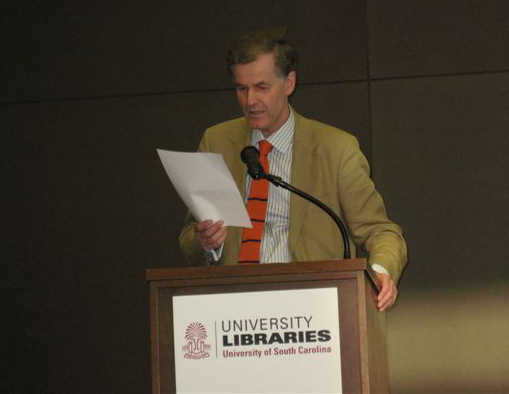
Robert Crawford during lecture at the University
of South Carolina. Picture provided by Dr. Patrick Scott
Crawford quoted the Ode to George Washington where America is called
“Columbia”: “Thy harp, Columbia, let me take.” The lecture reflected the
impression America and Washington made in the life of Burns. Crawford does
not hesitate to state that Burns became the poet of America before he became
the poet of Scotland. Frederick Douglas, John Muir, and Abraham Lincoln came
into play, particularly the visit of Douglas to Scotland and the impact of
Burns on Lincoln who throughout his life quoted and referenced Burns.
Crawford then drew us To A Mouse which he stated “can be read as one
of Burns’s cuddliest poems, but it is not” – it is much more, as the Bard of
Liberty’s use of the words independence and interdependence
are paramount.
Robert Crawford is a brilliant man, and just as importantly, a man of
humility. He is at home with fellow Burnsians, poets, academics, and lay-
people like me. In less than 24 hours, Susan and I heard him at his best
with his poetry and his presentation on Robert Burns. We will remember this
whirlwind trip for a lifetime.
A
tip of the hat to Dr. Patrick Scott, Director of Irvin Department of Rare
Books & Special Collections at the University of South Carolina Libraries,
for his help in supplying pictures and comments on Crawford’s lecture. Dr.
Scott once again is to be congratulated for planning and executing another
outstanding Scottish program. It was a marvelous meeting, and I only wish
more of my family and friends could have been present.
Later, back home at Waverley, I found myself going to a book shelf and
pulling down The Poetry of Robert Burns edited by W. E. Henley and T.
F. Henderson, an oft consulted set of books. I found a quote from Burns I
must leave with you:
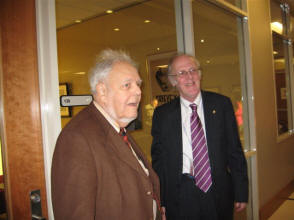
(L-R) Professors Ross Roy and Patrick Scott at
reception following lecture
“I
am just going to trouble your critical patience with the sketch of a stanza
I have been framing as I paced along the road. The subject is Liberty: you
know, my honoured friend, how dear the theme is to me. I design it as an
irregular ode for George Washington’s Birthday. (R. B. to Mrs. Dunlop, 24th
June 1794).” Hail Columbia and George Washington, and I extend my deepest
thanks to Robert Crawford for this excellent double-feature presentation!
(FRS: 11.18.10)
|

